#jason son of aeson
Explore tagged Tumblr posts
Text

#i've been reading the argonautica#tagamemnon#jason of iolcus#jason son of aeson#odysseus#the argonautica#the odyssey#greek mythology memes#16625th post
93 notes
·
View notes
Text

The argonauts are fightingggg and they haven't even set off yet!
"So he spoke, but Idas son of Aphareus burst into laughter and with scorn in his eyes he replied abusively:
'Come now! Tell me this through your prophetic skill: will the gods destroy me in the way your father bestowed the destruction upon the Aloiadai? Take thought for how you will escape my hands if you are found to have uttered empty prophecies!'
So he attacked him angrily and the quarrel would have gone further had not the son of Aison himself restrained their dispute with words of rebuke. Moreover Orpheus took up his lyre in his left hand and began to sing.
- Jason and the Golden Fleece, Book 1 lines 486-494, Apollonius of Rhodes as Translated by Richard Hunter.
Idas really said chat shit get hit. Atalanta is not present in this translation but I simply want her there.
#jason and the argonauts#tagamemnon#greek mythology#classics#ancient greek mythology#greek heroes#jason and the golden fleece#jason son of aeson#peleus#the argonautica#the argonauts#Atalanta#Orpheus#hercules#herakles#idas#idmon#idmon son of Apollo#apollo#argonauts#so many prophets on the argo#and they still forget hercules
133 notes
·
View notes
Text
i was looking up something about jason on wikipedia and you know that little introductory box?
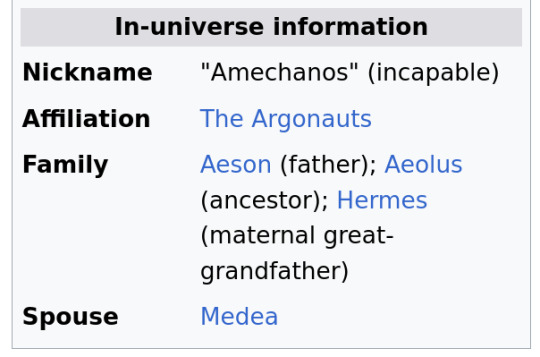
YOU'RE GONNA INTRODUCE HIM AS AMECHANOS FIRST THING?????
#what you need to know about jason son of aeson: 1. he's FUCKING USELESSSSS#i do question simplifying 'epithet' to mean 'nickname' though. they're not like 'HEY! INCAPABLE!' (actually telamon probably would tho)
188 notes
·
View notes
Text
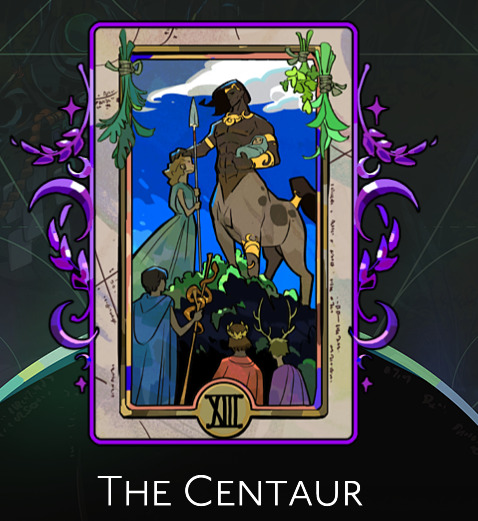
EEEEEEEE Okay so if you’re like me and closely examining every single thing on each of the arcana cards, you’ve probably wondered who all these kiddos are that chiron’s got with him
I’m sure most of us have gathered that the one getting head pats is achilles, considering he’s got curly blond hair, wearing green and holding a spear. But who are the others? And whose baby is that???
Well wonder no more! Hopefully! If I’m right! Because a quick look at a short list of chiron’s apprentices on wikipedia has provided me answers! (This ended up being incredibly long-winded I apologize in advance)
Let’s start at the bottom from left to right. On the far left we a boy draped in blue and holding a staff, a bronze snake wrapped around it. If you know anything about the origin of medical symbols you’ll know that this is asclepius and his famous rod (ha) that, at some point in history, got mistaken for hermes’ caduceus. Thus that’s why it’s the caduceus and not the rod of asclepius we see on hospitals and stuff. But I digress!
Asclepius is the god of medicine and the son of apollo, who was trained in the art of medicine by chiron. So it makes sense why he’s here!
In the middle we have a boy clad in red and wearing golden laurels. I believe that this could be jason of argonaut fame. Long story short, jason’s uncle pelias overthrew his half-brother aeson (jason’s father) and killed all his descendants. Alcimede, jason’s mother, saved her newborn son by having the nursemaids cry over him as if her were stillborn. She then managed to sneak away and give jason to chiron, who raised and trained him. Eventually jason does who whole golden fleece thing and becomes the king of iolcus, though he and medea were quickly exiled afterwards.
On the far right we see a boy clearing purple with deer antlers on his head. If you’re a big artemis fan like me you’ll recognize this guy pretty easily. This is actaeon, a theban hero trained by chiron who’s most famous for earning the wrath of artemis. While out hunting one day he came across the goddess and her nymphs bathing, instead of minding his damn business he decides to peep on her. Rightfully enraged, artemis curses him and forbade him from speaking another word, lest he be transformed. Upon hearing his hunting party he calls out (in some versions he tries whistling for his dogs) and he transforms into a stag. His hunting party finds him, and, seeing a stag in his place, his own dogs tear him a part and kill him.
FINALLY, we have the newborn baby chiron is holding. Now, chiron does have a few children of his own, so it’s possible it could be any one of them. But I think instead it’s a lad named medus, or polyxenus, or medeus it really depends. He’s the son of jason and medea, and like his father, he was also trained by chiron. But honestly that baby could be anyone lmao
Oh god I yapped on for more than I should have WHOOPS 😭 I hope you all enjoyed this quick mythology lesson lol
#welcome back to hades yap sesh with ya boy lobz#yes im very normal about chiron why do you ask#ouhfgghhfhghhh supergiant games I am constantly impressed by how much attention to detail you give to everything#like you can really tell that they actually give a shit about greek mythology and do their research and all the good stuff#while still telling an original story no less#I will always glaze sgg forever and ever#hades 2#hades ii#hades 2 spoilers#chiron
189 notes
·
View notes
Text
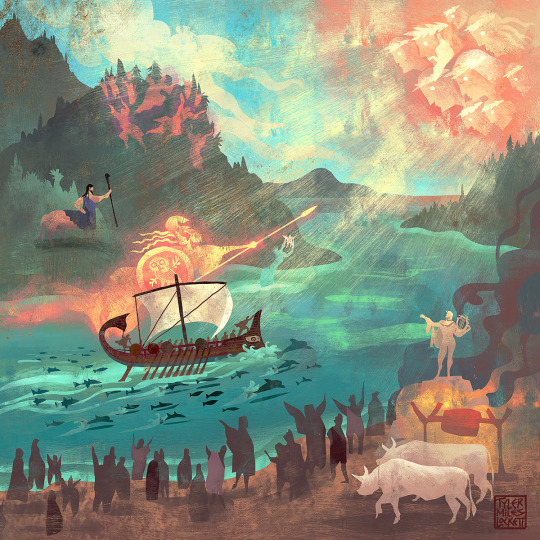
Book 1 of Argonautica begins with an invocation to Apollo and reference to a dark prophecy. King Pelias of Iolchus, (son of Poseidon and tyro), having usurped the throne from his half-brother, Aeson, is prophesied to be killed by a man wearing one sandal. When Jason, “son of Aeson,” arrives wearing one sandal at a court feast honoring the gods, (but neglecting Hera) Pelias devises a deadly quest for the hero to retrieve the fabled Golden Fleece.
Argus, builds the great ship Argo with Athena’s guidance, who incorporates a piece of magical Dodonan oak, giving the wood keel the power of speech. Next, a lengthy list of the heroes and their family lineages is listed by Apollonius. At the shore, the gathered heroes, “shone like starlight between clouds,” (Poochigian). Needing a leader, Heracles suggests Jason, and the crew assents. They construct a beach shrine of stones and offer bull sacrifices to Apollo for a safe journey. That night over wine, an argument almost leads to blows in camp, but Orpheus calms the tensions with a lyre song about the primordial titans.
As the group sets out the following day the demigod and mortal heroes are looked upon favorably from the gods in Olympus, Mountain nymphs of Pelion, Chiron the centaur, with wife holding up infant Achilles, so the hero Peleus could see his son one last time. Orpheus plays a hymn to Artemis while fish leap about the ship’s wake.
After passing more landmarks such as Meliboea, the slanted city of Homola, Olympus, the Pallenean cliffs, and the Thracian Mountain of Athos, they row for the island of Lemnos, a place where the all-women society hold a dark secret.
Thanks for looking and reading! if you share this image ill be sure to sacrifice some sweets into my stomach for you during this holiday! xoxo
Want to own a book jam packed with over 130 illustrations like this? Support my kickstarter for my book "lockett Illustrated: Greek Gods and Heroes" coming in October.
https://www.kickstarter.com/projects/tylermileslockett/lockett-illustrated-greek-gods-and-heroes
#pagan#hellenism#greek mythology#tagamemnon#mythology tag#percyjackson#dark academia#greek#greekmyths#classical literature#percy jackon and the olympians#pjo#homer#iliad#classics#mythologyart#art#artists on tumblr#odyssey#literature#ancientworld#ancienthistory#ancient civilizations#ancientgreece#olympians#greekgods#zeus#hesiod
175 notes
·
View notes
Note
Thought on medus? His relationship with his mom? His age? His time imprisoned? The whole thing give me all of your thoughts and do not spill
took me a second to respond to this ask but I DO HAVE SO MANY THOUGHTS ABOUT MEDUS. how did you know.
He is so momma's boy coded I'm sorry. That man is JUST like his mother. They basically came up with the exact same lie to Perses just in reverse. The exact same ruse. As well as the idea that he followed her willingly after her exile from Athens + I'm partial to the interpretation that he named Media after his mother. So to me I read them as having been fairly close !
Age wise. Uhm. There's no untangling anything related to the argonautica to me I'm sorry. The Greek myths have no true timeline and the heroes' ages are elusive and ill-defined by nature. But if I had to guess I would place him as likely being 16-17 at the time of Medea's exile. Still fairly young.
Medus is really interesting to me as a character despite information about him being very. Sparse. In a lot of ways it almost feels like he sort of inverts a lot of the traits of a typical Greek hero. His father is almost entirely irrelevant to his story. He isn't later compelled to take revenge on Aegaeus or kill Theseus for the throne of Athens (think Jason/Pelias or Pelias/Aeson). After he leaves Athens, he's completely uninvolved with his father or his father's line. Instead, his story focuses entirely on his mother's line. He's named after his mother. In a lot of ways he's a hero who's story is entirely defined by his relationship with his mother. Aside from maybe Achilles it's not something I can recall many examples of.
Like. Okay I know I've mentioned in the past that part of what makes Medea's decision to kill her kids compelling to me is the interpretation of her deciding to do it, in part, to spare them from the cycle of tragedy stemming from the glory-seeking, patriarchal society of Greece (They must die/and since they must/I who gave them birth will kill them). Her children are the sons of a hero, and as all sons of a hero are bound to do, they will suffer for their father's glory. Contrasting that with Medus. How his life is so obviously centered on her. It feels like a reversal.
They're both very interesting to me if you could not tell
#txt#munitalks#medea#medea of colchis#medus#argonautica#apollodorus#euripides#I'm pulling from several different sources for this#just related to my personal interpretation of medea and medus#there's a bunch of different variations to her story post argonautica and this is somewhere in the middle of that I suppose#also this post is NOT me saying Medea did nothing wrong btw#she's a deeply flawed and nuanced character#and i love her dearly#tagamemnon#greek mythology#greek classics
18 notes
·
View notes
Text
The myth of Medea (1)
As I went across the various Dictionaries of Myths I talked to you about, I noticed quite a number of Medea-related articles. So, let’s begin with an article about the “Antique Medea”, written by Alain Moreau. As usual, loosely translated by me.
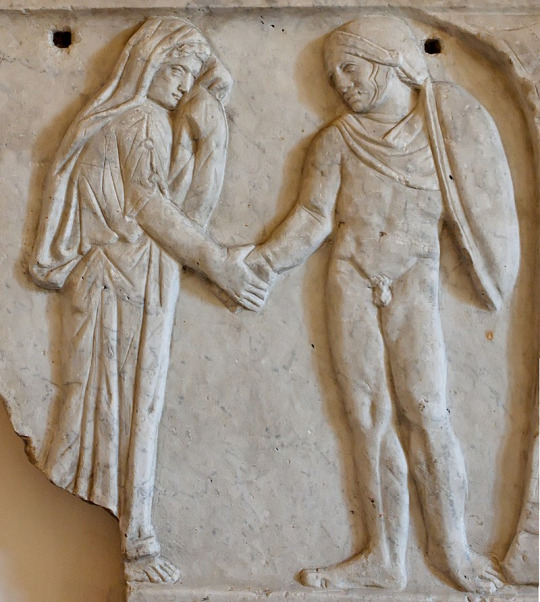
I/ Positive beginnings
A dreaded sorceress and a bloodthirsty killer: those are the two traits that have been imposed on any depiction of Medea, and that for a very long time. To be precise, this portrait can be dated back to Euripides’ Medea in 431 BCE. It might surprise one to discover that it was not always the case, and that the original Medea might have been a benevolent goddess. As often in mythology, the name reveals (or betrays) the origins: Medea’s name seems to be formed of the Indo-European root “med”, which split in modern language in two domains, the one of “meditation” and the one of “medicine”. This etymological origin is reflected in the myth, as Medea prepares all sorts of medicine and remedies – it is with them that, during her stay in Thebes, she healed Herakles who had just murdered his own children after being cursed with madness by Hera. She is also depicted as having the power of rejuvenating the old Aeson, Jason’s father, as well as giving back youth to Jason himself and to the Hyades, the nurses of Dionysos. It is also her who, in Colchis, covers Jason’s body with an herbal ointment which protects him from the deadly fire blown by the bulls of Aietes (the herb used was the legendary “prometheion”, which appeared on the slopes of Caucasus from the blood of Prometheus which falls to the ground each time Zeus’ eagle comes to eat the Titan’s liver). Considering all of this, it is very likely that Medea was originally one of the manifestations or avatar of the great Mother-Goddesses that were once honored throughout Greece and the Near-East, in the image of Cybele, Gaia, Rhea or Demeter. It is not a surprise, according to this reading, that one day she gains for a paredra a male god of smaller importance, “Iasôn”, Jason, whose name is linked to the verb “iaomai” (to heal), to the character of Iasô, a goddess of health daughter of Asklepios, and to the term “iatros”, a doctor, a term still found today with terms such as “psychiatrist” or “pediatrist”.
Up until this point all is good. In the second stage of her evolution, Medea stays a benevolent character, but the goddess leaves the context of religion (and thus a static and synchronic state) to enter a “chronical” state, the one of a tale inscribed in time, the one of the legend and the myth. She becomes a helper, an auxiliary, who helps the hero to perform what seems to be impossible deeds. Thanks to her, Jason dominates the fire-breathing bulls, kills the giants born out of the ground, becomes the owner of the Golden Fleece, escapes Aietes’ ships. According to Hesiode, it is thanks to her, thanks to his new wife, thanks to the “virgin with glittering eyes” that Jason could return to Iolkos safe and happy. Still according to Hesiode, once back to Jason’s homeland she gave him a son, Medeios, who was raised by Chiron in the mountains ; and all of this was part “of the plan of the Great Zeus”. Reading these lines, one can hear the ending of a fairytale: “They married, had many children, and lived happily ever after”. With the slight nuance that Hesiod claims they only had one son.
Things however were already starting to look dark. Because in this tale, we recognize a folkloric motif: the hero of the folktales must triumph of the traps laid before him with the help of a princess. However this theme is deeply linked to another fairytale motif: “the hero is helped by the devil’s daughter”. Aietes, indeed, is a being of the Otherworld. He is the master of Aia, “the land”, a nameless land, located far away in the East, and which can only be reached by crossing the unpassable rocks, the Symplegades, similar to the doors of Hades. The difference between the myth of Jason and the fairytales is that, in folklore, the devil’s daughter usually stays with her father. The terrible mistake of Jason, or rather his respect of the deal he formed with Medea (the idea of Jason’s perjury only comes in later evolutions), leads to him bringing her into the world of humankind, where she does not belong, and where she can only cause blood and death. Pindar depicts, in his fourth Pythic, a blond-haired Jason filled with male confidence who accepts the terrible trials imposed by Pelias the usurper, and who leads gloriously the Argonauts expedition towards the Golden Fleece – but if Pindar presents us a beautiful and positive picture, in truth, already by 462 BCE, the myth of Jason and Medea is blood-stained.
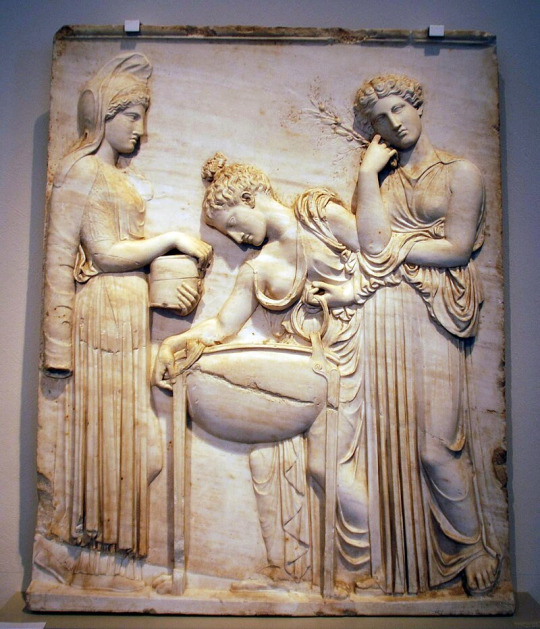
II/ The infanticide
The determining element that shifted the glorious myth to the abominable tragedy is the theme of the infanticide. It appears with the epic poet Eumelos (8th or 7th century BCE) where Medea kills by accident her children in an attempt to give them immortality, by burying them in the sanctuary of Hera (the katakryptia process). But she fails, just like Thetis failed to give immortality to her son Achilles: the children die smothered alive. Medea has good intentions, but commits a bad action. Then, with the epic poet Creophylos (third quarter of the 6th century BCE), Medea is falsely accused by the Corinthians of killing her children, because they want to get revenge on her for the murders of king Creon and the princess Creusa/Glauke. Finally, it is Euripides, in 431, who synthetizes the two versions: he is the first to write that Medea actually and willingly killed her children.
As soon, the new image of Medea is set and fixed: she is a killer of men. She killed her brother Apsyrtos, that she stabbed before cutting him into pieces and throwing them in the sea, to slow down the Colchian pursuers. She killed the father, since he received an oracle telling him he would die by losing the Golden Fleece (according to Diodorus, he died during a night battle between the Colchians and the Argonauts). She killed Pelias, the uncle of her husband, manipulating his daughters into slitting his throat in the hope of bringing him back to life in a magic cauldron. She killed the king of Corinth, Creon, who was guilty of trying to marry Jason to his daughter, and to exile Medea. She killed her children, all boys – and this is the most famous part of her myth. She killed her husband, that she convinces to sleep by the shadow of the Argo, which was rotting on the sand: a piece of it falls and crushed his head. Finally, she is the killer of Perses, Aietes’ brother, who had usurped Colchis’ throne. Only Theseus managed to escape death at her hands in Athens.
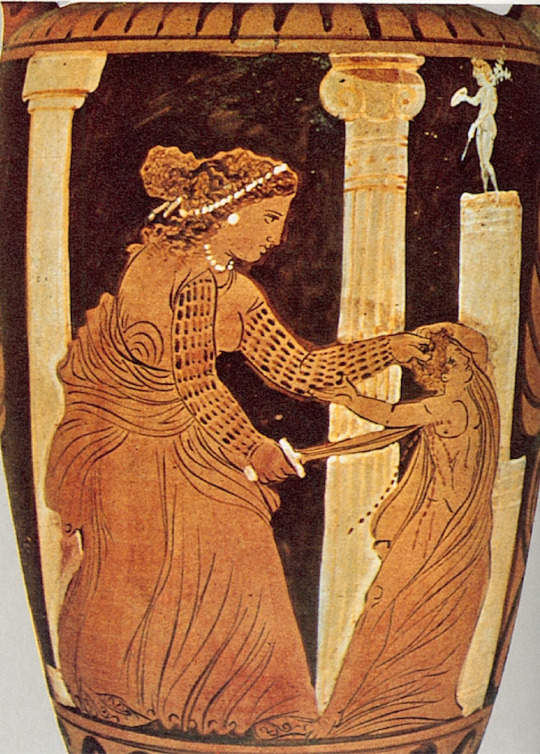
III/ From one myth to another
Euripides is thus the one who completely shifted the myth and turned Medea into this beautiful and dangerous character that imposed herself in literature. By showing, at the end of his play, Medea flying away of the palace on a dragon-tied chariot sent by her grandfather Helios, he gives her back the supernatural nature she had lost by being turned into the princess of Colchis. But the benevolent goddess has been turned into an elemental power, monstrous and maleficent. According to Seneca, the name “Medea” is linked to other words in “m”: “mare” (the sea), “metus” (dread), “malum” (evil), “monstrum” (monster), “Medusa” (the Gorgon). She is also the “mater”, the mother, but a mother who kills her children. The summit of this nefarious power is reached with Dracontius, at the end of the 5th century CE, who tells of how Medea manages to “remove the horns of the full moon”, an immense feat of magic never repeated to this day. Considering this, it is quite surprising to see that Medea now ends her career as the mere wife of Achilles (alongside Helen, Iphigenia, and Polyxene) in either the Elysian Fields or the Blessed Islands. This part of the legend appeared with Ibycos, in the second half of the 6th century BCE, before being repeated by Simonide (556-467 BCE) and finally by Lycophron, an “antiquarian”, that is to say a mythographer who collected the older and more ancient versions of legends, those of a time when Medea was a benevolent entity.
We already saw two of the reasons that explain why Medea the generous goddess becomes the bloodthirsty monster: first, the introduction of a being of the Otherworld into the human world that is the Greek civilization ; second, the evolution of the motif of the infanticide. But there are three other important elements to take into account. First of all being her relationship with Thessaly: Medea is linked to this country through Jason, who is born in Thessaly, and through the city of Ephyra. The Thessalian land was considered to be the country of witches: the Latin poets and writers always had the word “witch” or “sorceress” be followed by the adjective “Thessalian”, and the connotations of witchcraft were almost always negative.
The second element to take into account is Medea’s relationship with the Orient, which also brings us back to witchcraft and magic. It is from the East that Helios rises every day on his chariot, on his journey to the West, and Helios has among his descendants many witches, such as Circe, Pasiphae… or Medea. But above all, the Orient is characterized by cunning, cruelty and barbary, all traits that Medea bears when she tricks the daughters of Pelias, when she lies to Creon and Jason, when she kills and disembowels, when she had the Corinthian princess die in atrocious pain through a drug that burns her like acid. The Barbarian is the invader, like the Medes who had invaded Greece (and whose name was linked to the one of Medea): this is why all the iconographic depictions posterior to 480 BCE (the battle of Salamine) show Theseus the Greek fighting against Medea the Mede.
The third reason for this change of good to evil is that, at least since Euripides, Medea is perceived as a “virile woman”: in a Greek society dominated by men, such a masculine woman is to be a monster. Euripides has her use constantly a military language: she prefers to be “three times on the line, three times with the shield by her side” rather than to “give birth one more time” ; she wants to “do like hoplits”, she wants to use a word, to use strength, she keeps talking about her enemies and her glory. The Athenian, who typically locks up his woman in the gynecea, can’t stand such words.
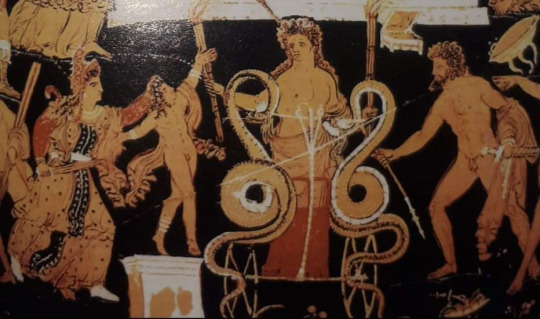
IV/ Terror and pity
Yet, Euripides is a much too talented of a playwright to create just a melodrama character. He uses the two tools of the tragedy, terror and pity. Medea is also the poor young woman abandoned by the one who seduced her, she is alone, far away from her family, of which she cut herself off due to her actions. She is the bronze-skinned foreigner that is disdained and dreaded, and as such she is the perfect scapegoat. She is a being of flesh torn by conflicting feelings, her hatred for Jason, and her love for her children ; children that she turns into tools for her revenge against her cowardly and unfaithful husband, while perfectly knowing that the crime she is about to commit will break not just Jason’s heart, but also her own. This duality is still maintained centuries after Euripides. Most authors of Antiquity (Ovid, Seneca, Dracontius) put a focus on the violence and monstrosity of the character – outside of a few, such as Apollonios of Rhodes or Valerius Flaccus, who rather focus on the birth of Jason’s and Medea’s love. However, modern and contemporary authors are much more nuanced: as such Cherubini, Lamartine, Grillparzer and Legouvé focus on the duality of Medea, putting at the center of their work the idea of this dark-skinned foreigner who is both dreaded and rejected. The picture of Medea as the gypsy woman is central in the works of Anouilh, Max Rouquette and Christa Wolf, who all stay faithful to the themes of the pharmakos and of the scape-goat, already present by Euripides’ work.
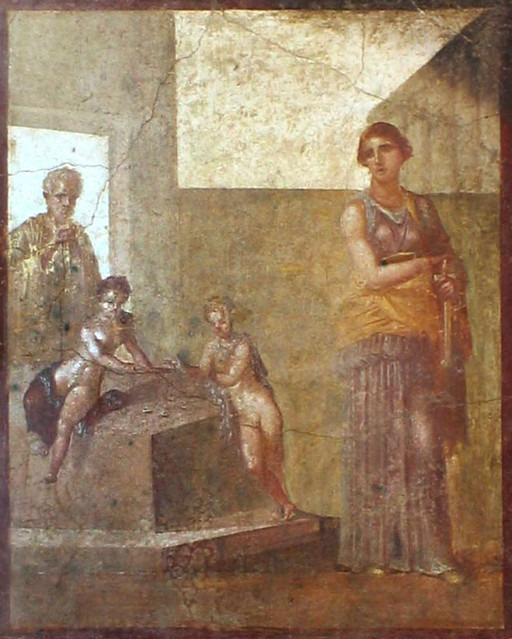
27 notes
·
View notes
Text
jason, the unconventional hero (asteroid 6063)
"when talking about such a popular god/ goddess/hero i am going to for warn paraphrasing - of course all these stories have more details and all these popular gods have stories within stories. i would love to share them all/in detail but i would need a book and a lot more time to write it. my attempt in writing these posts are to inform you on the high level story of the god’s or goddess’s life. that being said if any one of the events regaled in the post pique you interest - please let me know i don’t mind giving a more in-depth tale of any of the events mentioned."
paid reading options: astrology menu & cartomancy menu
enjoy my work? help me continue creating by tipping on ko-fi or paypal. your support keeps the magic alive!
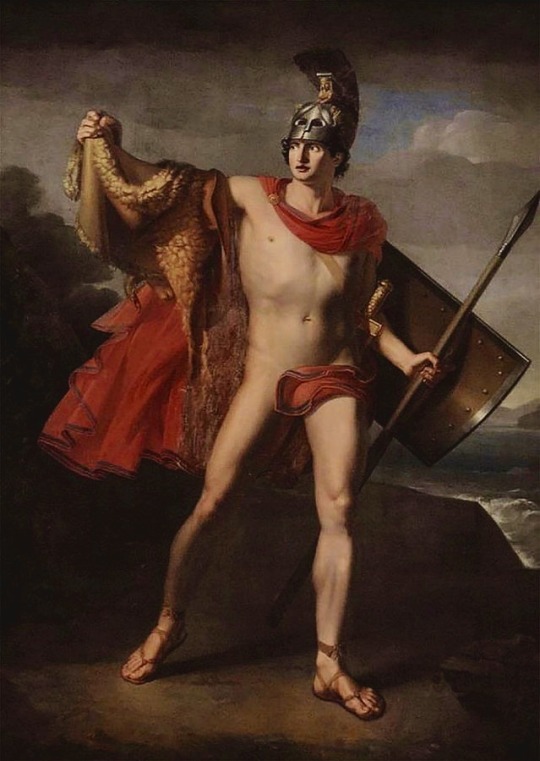
Son of King Aeson and leader of the Argonauts, Jason was sent away at a young age before he was more than just a boy prince. His uncle seized the land his father ruled - his father sent Chiron to raise him due to this. When he returned to his homeland as a young man, he came upon an old woman near a river who asked him to help her cross it. Jason took the woman across on his shoulders - this woman was Hera, who his uncle allegedly had been neglecting to worship. Hera inspired the boy to see his uncle. Pelias immediately felt mortified as he noted Jason was missing a sandal - for years he worried that someone would challenge him. So, in those years, he visited with an oracle who told him that he should be wary of a man with only one sandal. He immediately feared his nephew was there to steal his throne - so he questioned Jason about what he would do if someone challenged his reign. Jason answered as that he would send them on a quest for the Golden Fleece - these words were spoken by Jason but were guided by Hera once more. Pelias told him that is what Jason would have to do to prove he was the rightful king of the land. Jason was off to start readying himself for the journey - with Athena's guidance, he found the shipbuilder Argus who crafted Jason's ship, the Argo. He then recruited the Argonauts: Heracles, Castor, Pollux, Meleager, Orpheus, Peleus, and Telamon. Jason and the Argonauts traveled to islands made up of cursed women, six-armed men, Amazons, etc. Eventually he received the fleece with the help of the enchantress Medea (this part of the story, I have told - I will leave it to her post because, let's face it, she did basically all the work). The two fled together under near constant chase of her family - until eventually they found that if they were married they would have no right to chase after her. The two married; as we know from her side of the myth their relationship is an odd one. She tricks his cousins into killing their father King Pelias, his cousin kicks him out, Jason remarries - not really because Medea burns her in her wedding gown, Medea kills their children, etc. Unsurprisingly, Jason is abandoned by the gods because of his disloyalty to Medea and their shared vows. Jason then lives out the rest of his days alone - ironically, the rotting Argo collapses on him and Jason dies from a crush wound in his sleep. IN MY OPINION Jason in your chart can represent a) how you can improve your leadership skills, b) where you are a pawn in karma's game, c) where the gods guide you, d) where you get a lot of help from others, and/or e) how/where your break vows.
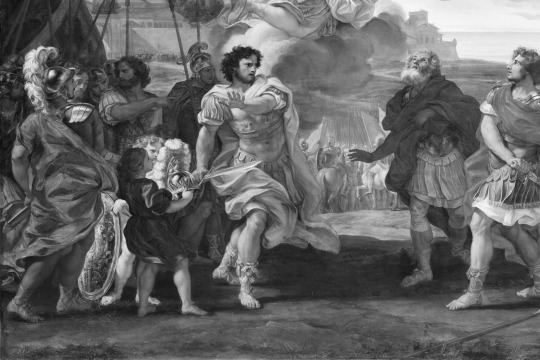
i encourage you to look into the aspects of jason along with the sign, degree, and house placement. for the more advanced astrologers, take a look at the persona chart of jason AND/OR add the other characters involved to see how they support or impede jason!
OTHER RELATED ASTEROIDS: hera (103), heracles (5143), athene (881), pallas (2), orpheus (3361), chiron (2060), peleus (11311), telamon (1749), and medea (212)!
have ideas for new content? please use my “suggest a post topic” button!
return to nox’s guide to metaphysics
return to the masterlist of greek myths & legends
#astrology#astro community#astro placements#astro chart#asteroid astrology#asteroid#natal chart#persona chart#greek mythology#astrology tumblr#astro notes#astrology notes#astroblr#astrotips#astrology readings#asteroid6063#jason#hera#asteroid103#heracles#asteroid5143#orpheus#asteroid3361#medea#asteroid212#chiron#asteroid2060#athene#athena#pallas athena
36 notes
·
View notes
Text
Love blinded fools
On the plains of Attica Medea wanders in search of a new refuge, as she walks a familiar voice fills her mind, “Here you are again, another exile, another attempted murder, I pity you, yet I do not know why, I should hate you more than any other”
Medea replied to what seemed to be her own thoughts “I do not need your pity, I do not regret my choices… Jason.”
A mist wisped in front of her sight, it seemed to come from her own head or right above it, the cloud changed into a humanoid form before gaining the detail of her lover. His body was semi transparent, it was obvious to Medea that this was not him but his spirit.
Medea addressed the specter “What do you want from me? Have you come to take revenge?”
The figure responded “That was my initial plan but I discovered that because of our oaths our souls are chained together, if I were to kill you they would be separated and I would be sent to Tartarus, now to avoid that fate I will keep you alive and protect you from harm.”
Medea smirked, “Is that so?” She chuckled, “That’s your revenge? My dear betrothed always keeping me safe?”
Jason became flustered “Do not mock me vile woman! I will make your pain endless! You will watch all you know fall as you out live all!”
Medea’s grin grew as she spoke “Oh woe is me, what a terrible fate, I’m so sorry for ruining your life after you ruined mine!”
Jason’s blush grew “I can sense your sarcasm, witch! I have no other choice but to do this! I will have my revenge and have you suffer as I have!”
Medea replied “It would seem you are in a worse place than I, tell me son of Aeson, why does your face become red as it did during the times when you thought me your lover? Does some drop of affection still lie in your heart?”
Jason looked away to hide his face from her gaze, “Do not be so coy, I despise you, my face does not become red with love, it is rage!”
Medea grabbed his chin with her fingers and forced him to look into her golden eyes, she spoke with a soft almost flirty voice “I do not believe you, you said yourself you cannot bring yourself to hate me, you want to protect me again because it makes you feel good.” She put on a fake cute voice “Jason my dear savior, you took me away from my barbarian homeland and to beautiful Greece, I thank you my handsome, hero, husband!” Her voice returned to its softness “Is that what you wanted to hear? Did you want me to praise you?”
Jason was too flustered to speak, she was in complete control of him with nothing but her words.
Medea leaned in to whisper in his ear “Do you still love me?”
Jason’s body felt like it was on fire, he whimpered out a response “Yes, I do. I… missed being your hero.”
Medea kissed him and he returned it, whispering to him again after she pulled away. “There’s my hero, I love you too, now that you’re bound to me you can never leave my side for another woman.”
Jason whispered back smiling sheepishly, “I like that, I never want to leave you again, forgive me for what I’ve done, I’m yours.”
She placed her hand on his face and rubbed his cheek with her thumb, he melted at her touch. They smiled into each other’s eyes.
#greek mythology#the accursed series#tagamemnon#writing#medea#the argonauts#jason#jason and medea#jason x medea
5 notes
·
View notes
Text
JASON: THE LION, THE WITCH AND THE AUDACITY OF THIS MAN
Jason, the son of Aeson and the rightful king of Iolcus, was exiled by his uncle Pelias, who had seized the throne. Fearing that any surviving relatives of Aeson might one day challenge his rule, Pelias sought to eliminate them all. However, Aeson managed to secretly send his newborn son, Jason, to the wise centaur Chiron, who raised and trained him in the art of leadership, combat, and wisdom.
Still living in constant fear that his stolen kingdom would be taken from him, Pelias consulted the Oracle of Delphi. The prophecy warned him to beware of "a man with one sandal." Years later, when Pelias hosted grand games in Iolcus, Jason traveled there to reclaim his rightful throne. On his way, he encountered an old woman struggling to cross a river. Unbeknownst to him, this was the goddess Hera in disguise, testing his kindness. Jason carried her across, but in the process, he lost one of his sandals.
When Jason arrived at the games wearing only one sandal, Pelias immediately recognized the prophecy unfolding before him. Fearing Jason’s claim to the throne, he devised a seemingly impossible challenge—a quest to retrieve the legendary Golden Fleece. He promised Jason that, should he succeed, the throne would be his. However, in truth, Pelias never intended to step down, sending Jason on what he believed to be a doomed journey.
MEDEA
Medea was a powerful sorceress, the daughter of King Aeetes of Colchis, and granddaughter of the sun god Helios.
Jason met Medea during his quest for the Golden Fleece, which was guarded by her father, King Aeetes of Colchis. Medea, deeply in love and swayed by Jason’s promises of marriage, chose to betray her own family to help him succeed. She used her magic to protect him from the fire-breathing bulls, armed warriors, and even the dragon that guarded the Fleece.
When her father discovered her betrayal, Medea helped Jason and the Argonauts (Jason’s crew) escape. In a desperate attempt to slow their pursuers, she killed her own brother and scattered his remains at sea. Her sacrifice ensured Jason’s survival, but it also severed her ties to home forever.
The couple eventually arrived in Iolcus, where Jason sought to reclaim his throne from King Pelias. Once again, Medea played a key role. She tricked Pelias’ daughters into believing they could restore their father’s youth, only for the plan to end in his death. Though she had secured Jason’s revenge, the act turned public opinion against them, leading to their exile.
Seeking refuge in Corinth, Jason and Medea built a life together, raising their children. But Jason’s ambitions soon took precedence over his loyalty. He abandoned Medea to marry Glauce, the daughter of King Creon, securing a politically advantageous alliance. For Medea, who had given up everything for him, the betrayal was devastating.
By choosing the throne over his wife and children, he prioritized political ambition over the family Medea had sacrificed everything for. When Medea retaliated, Jason skillfully manipulated the narrative to cast himself as the victim and Medea as the villain. As a foreign woman and a sorceress, Medea was already viewed with suspicion in Greek society, making it easy for Jason to frame her as dangerous and unhinged.
He gaslighted her, dismissing her sacrifices and justifying his actions as necessary for his future, portraying her as an irrational, vengeful woman instead of a betrayed wife. His actions reinforced the societal biases that saw non-Greek women as outsiders and witches as threats, ensuring that Medea, rather than his own deceit and ambition, bore the blame for the tragedy that unfolded.
Jason’s betrayal of Medea, is a stark reflection of the patriarchal values that dominated ancient Greek society. Jason’s pursuit of power and political advantage over his loyalty to Medea highlights the way in which men often valued personal gain over emotional or moral bonds. Despite Medea’s immense sacrifices, Jason’s actions reveal how easily men could discard women once their usefulness or appeal was no longer aligned with their ambitions.
Medea, in this context, is not just a wronged lover; she is a victim of a system that repeatedly undermines women, reducing them to tools for men’s success or means of securing their positions. Jason’s decision to marry Glauce is a reflection of the societal norm that women were seen as objects to be traded, with their worth often tied to their connections, beauty, and the benefits they could bring to men’s political or social standings. [Credits: "Let's talk about Myths, Baby!" Podcast by Liv Albert]
0 notes
Text
Jason (/ˈdʒeɪsən/ JAY-sən; Ancient Greek: Ἰάσων, romanized: Iásōn [i.ǎːsɔːn]) was an ancient Greek mythological hero and leader of the Argonauts, whose quest for the Golden Fleece is featured in Greek literature. He was the son of Aeson, the rightful king of Iolcos. He was married to the sorceress Medea, the granddaughter of the sungod Helios.
1 note
·
View note
Text
Hebe goddess of youth Cupbearer to the Gods (potential topic for the green hat)
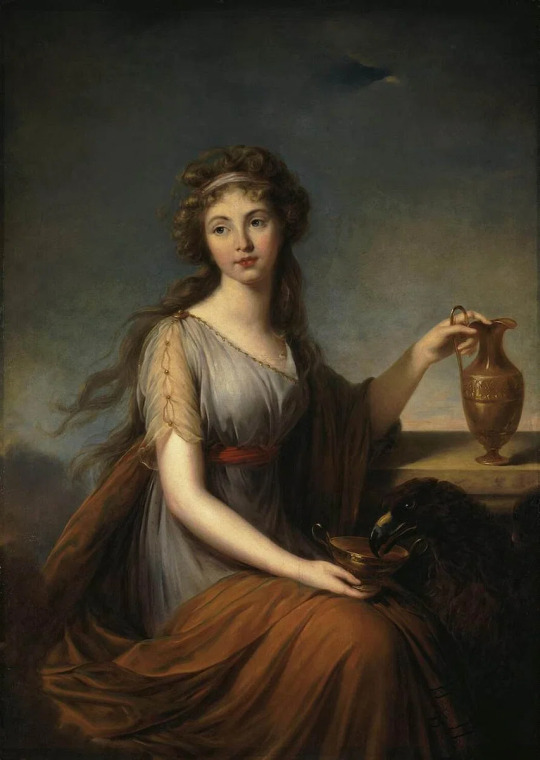
In a way, one can argue that hebe is a solution for aging and her chalice is a method of restoring youth… so like green hat let's go!!!!
Hebe (meaning "youth" or "bloom of youth") is the goddess and personification of eternal youth in Greek mythology. She is the daughter of Zeus and Hera and the wife of the Greek hero Hercules. Hebe serves as the cupbearer for the gods and goddesses of Mount Olympus, and she has the gift of restoring youth to mortals.
HEBE SERVED THE DEITIES OF MOUNT OLYMPUS WITH WINE, NECTAR & AMBROSIA IN GOLDEN GOBLETS.
Although Hebe was the daughter of the king and queen of the gods, she was given the role of cupbearer to the immortals. Her role is in line with ancient patriarchal customs, where the females in the home assisted with serving guests. She served the deities of Mount Olympus with wine, nectar, and ambrosia in golden goblets. In the Iliad, Homer mentions that Hebe served wine to the gods as they watched the battle between Menelaus and Paris.
Hebe's time as cupbearer to the gods came to an end after she experienced a moment of ungracefulness and slipped while serving the gods. Zeus immediately dismissed her from her role and replaced her with the Trojan youth Ganymede, considered the most beautiful mortal by Zeus. Naturally, Hera was angered by her daughter's dismissal and her husband's affection for Ganymede. Annoyed by her anger, Zeus only continued to show his love for the youth by setting Ganymede's image among the stars as Aquarius, the water-bearer.
Other sources state that Hebe stopped being the cupbearer to the gods when she married Hercules. Early on, Hebe was known as Ganymeda, which suggests that this deity was split into two – the male Ganymede, who carried on the job of cupbearer to the gods, while Hebe became a wife to Hercules and a mother to their two sons.
AS THE GODDESS OF YOUTH, HEBE HAD THE POWER TO RESTORE YOUTH TO MORTALS.
As the goddess of youth, Hebe had the power to restore youth to mortals. The ancient Greeks viewed her as being brave and generous. Philostratus of Lemnos (190-230 CE) writes that Hebe was the youngest of the gods and the most loved. According to him, Hebe is the reason why the Olympian gods are eternally young. Hebe's power is touched on in a few myths, which are retold in Ovid's (43 BCE to 17 CE) Metamorphoses.
The Greek hero Jason pleaded with his sorceress wife, Medea, to take years off his life and give them to his ailing, elderly father, Aeson, so that he may live longer. Medea refused to do this, not able to face taking years off her husband's life. Instead, she told Jason that she would ask Hecate for help. Medea and her dragons roamed the Earth for nine days, collecting herbs of renewal. She built two altars of green turf, one dedicated to Hecate and the other dedicated to Hebe. She invoked the sorceress and goddess of youth for help. Sure enough, with their help, Medea was able to restore Aeson's youth.
Hercules asked his wife to bestow the gift of youth to his dear friend and nephew, Iolaus, so he could take revenge on King Eurystheus for the hardship he had put Hercules, Iolaus, and their families through. Hebe agreed and gave Iolaus his youth back, but then swore that she would never use her gift on anyone else. However, Themis, the goddess of justice and divine law, stopped her from making that promise and reminded her of the Theban civil war taking place.
Themis prophecized that Callirhoe, daughter of the river god Achelous, would beg for Zeus to add the years that Iolaus had lost to her own young sons so that they could avenge their father. Hebe's gift would therefore be granted through Zeus' intervention. The gods were not happy that others would be given the gift of youth, and each one put forward someone they had in mind to receive Hebe's gift.
3 notes
·
View notes
Text
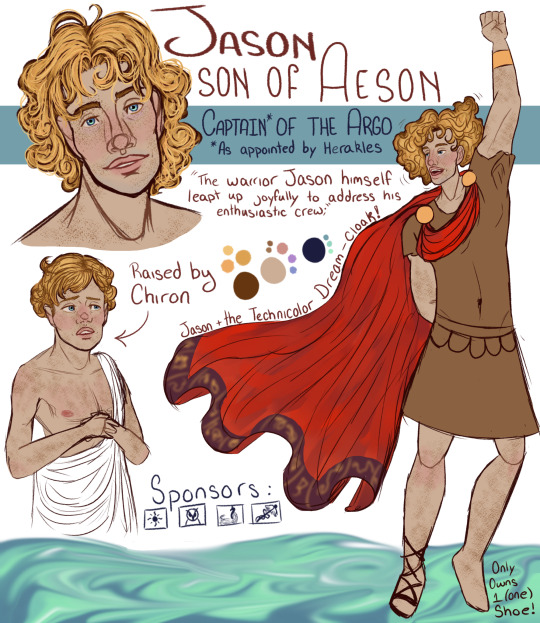
Currently reading Richard Hunter's translation of Jason and the Golden Fleece
#tagamemnon#greek mythology#classics#ancient greek mythology#the argonauts#the argonautica#jason and the argonauts#jason and the golden fleece#jason#jason son of aeson#greek heroes#apollonius of Rhodes#jason and the technicolor dream cloak
16 notes
·
View notes
Text
Medea's Curse
“And she, holding the fold of her purple robe over her cheeks on each side, mounted on the deck; and Aeson’s [Jason's] son took her hand in his and guided her way along the thwarts. And with songs did she propitiate and invoke the Death-spirits [Keres], devourers of life, the swift hounds of Hades, who, hovering through all the air, swoop down on the living. Kneeling in supplication, thrice she called on them with songs, and thrice with prayers; and, shaping her soul to mischief, with her hostile glance she bewitched the eyes of Talos the man of bronze; and her teeth gnashed bitter wrath against him, and she sent forth baneful phantoms in the frenzy of her rage.
Father Zeus, surely great wonder rises in my mind, seeing that dire destruction meets us not from disease and wounds alone, but lo! even from afar, may be, it tortures us! So Talos, for all his frame of bronze, yielded the victory to the might of Medea the sorceress.”
.
— transl. RC Seaton, The Argonautica. 1912
.
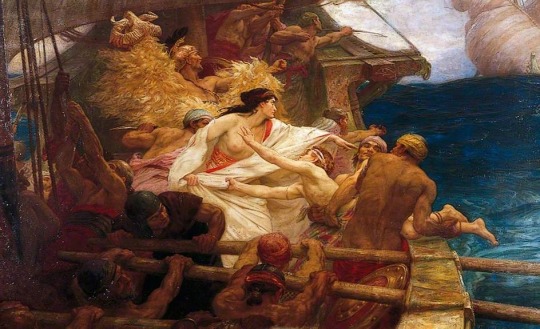
...
[Image description: Painting by Herbert James Draper, “The Golden Fleece” showing Medea and Jason (sporting the Golden Fleece) aboard a ship surrounded by the crew. Medea is wearing white trimmed in red, with dark hair and one exposed breast. She is pointing to the right of the painting. There is a lot of motion in the image, and the sea is deep blue behind them. Another ship can be seen close on the horizon. Note: this painting illustrates a different scene in the poem than the one described in the text of this post. End description.]
69 notes
·
View notes
Text
An Introduction to Worshipping Medeia
As a Hellenic witch, the worship of Medeia is an important part of my practice. She was a witch and priestess of Hekate, possessing nearly unparalleled knowledge of magic and poisons. I wanted to write this post to give some background on who Medeia is, her role as a witch and a priestess, and how I have come to honor her in my practice.
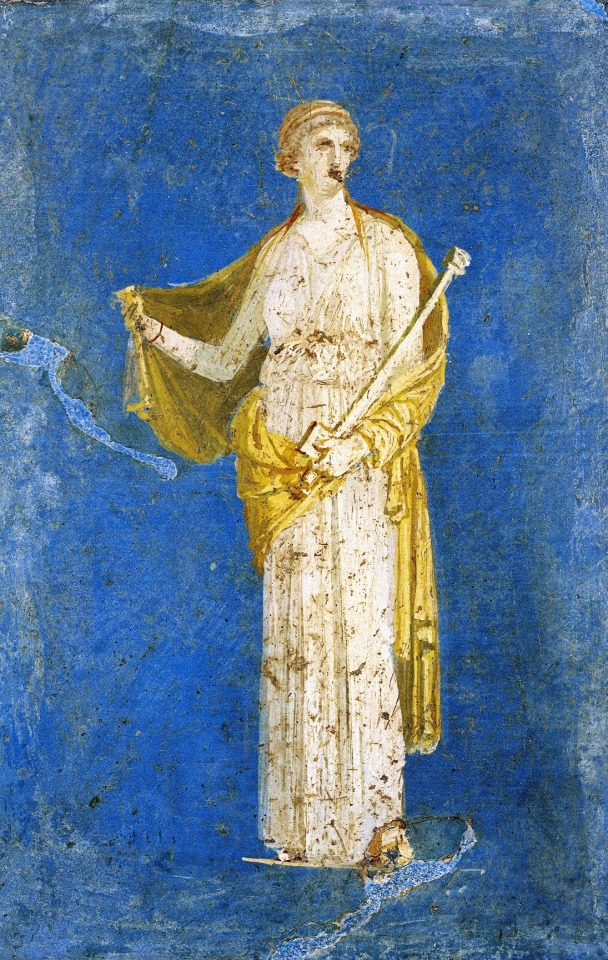
Who is Medeia?
Parentage
Medeia (Μήδεια) is given mainly two parentages, either Aeetes, son of Helios, and Eidyia, daughter of Oceanus, or Hekate and Aeetes. Hesiod offers us a description of the first, writing:
“To the tireless Sun the renowned Oceanid Perseïs bore Circe and King Aeetes. Aeetes, son of the Sun who makes light for mortals, married by the gods’ design another daughter of Oceanus the unending river, fair-cheeked Idyia; and she bore him the trim-ankled Medea, surrendering in intimacy through golden Aphrodite” (Hesiod 31)
Alternatively, Diodorus names Hekate and Aeetes as her parents, explaining:
“Perses had a daughter, Hecate, and she excelled her father in her brazen lawlessness...She was a keen contriver of mixtures of deadly drugs [pharmaka], and she discovered the so-called aconite. She tested the powers of each drug by mixing it into the food given to strangers...After this she married Aeetes and gave birth to two daughters, Circe and Medea, and also a son Aigialeus” (qtd. in Ogden 78)
Either of these parentages could make sense, but I personally observe the first.
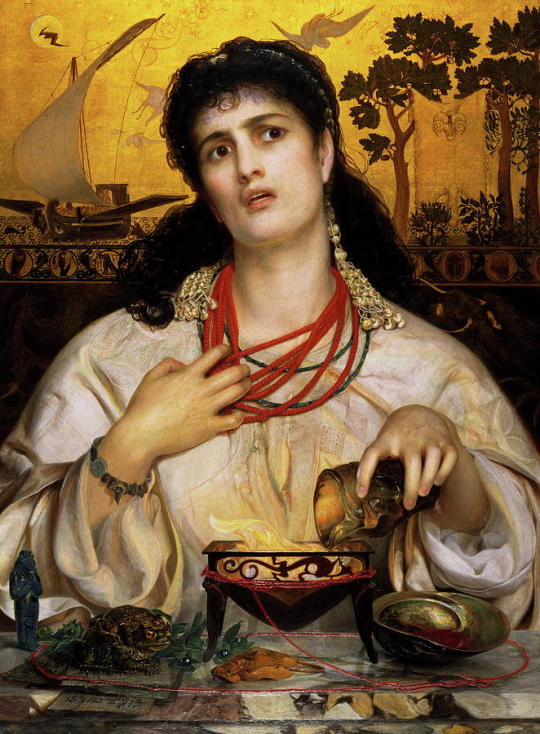
(Art: Medea by Frederick Sandys)
Medeia as the Witch Priestess of Hekate
One of Medeia’s most important roles in literature and myth is that she is a priestess of Hekate and a witch, being called “Medea of the many spells” (Apollonius of Rhodes 109). In most literature there is no way to separate these roles.
She was extremely devoted to Hekate, Apollonius of Rhodes stating that “as a rule she did not spend her time at home, but was busy all day in the temple of Hecate, of whom she was priestess” (116). Euripides also writes that Medea says “I swear it by her, my mistress, whom most I honor and have chosen as partner, Hecate, who dwells in the recesses of my hearth” (Euripides 13). Clearly, the relationship between her and Hekate was very close, and it was said on occasion that she even learned magic from Hekate, Herself. Apollonius of Rhodes writes that “[t]here is a girl living in Aeetes’ palace whom the goddess Hecate has taught to handle with extraordinary skill all the magic herbs that grow on dry land or in running water” (123). Diodorus also claims this, but adds an interesting addendum that attributes to the character of Medeia:
“They report that Medea learned all the powers of drugs from her mother [Hekate] and her sister [Kirke], but her own inclination was the opposite. For she continually saved the strangers that put in from dangers” (qtd. in Ogden 79)
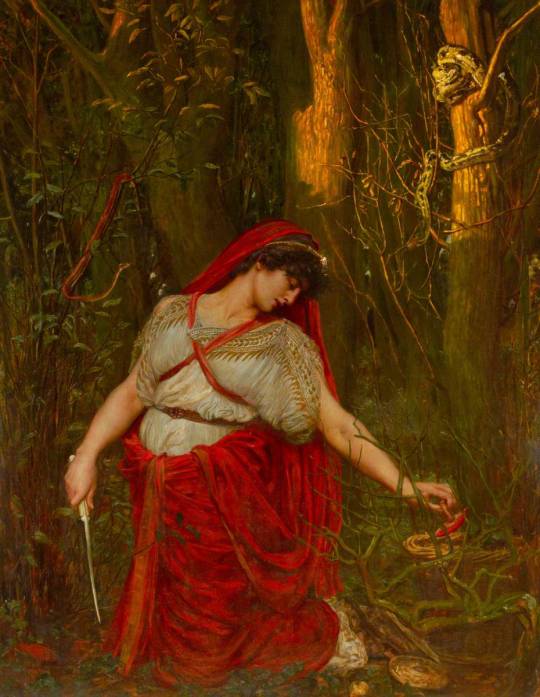
(Art: Medea the Sorceress by Valentine Cameron Prinsep)
Regardless of the origins of her powers, they were no doubt incredible. Apollonius of Rhodes explains that “she can put out a raging fire, she can stop rivers as they roar in spate, arrest a star, and check the movement of the sacred moon” (123). In one instance Apollonius states that “the beautiful Medea spell through the palace, and for her the very doors responding to her hasty incantations swung open of their own accord...From there she meant to reach the temple. She knew the road well enough, having often roamed in that direction searching for corpses and noxious roots, as witches do” (148). This is clearly an indicator that her powers are incredible, but what is even more awe-inspiring is what Apollonius says happens next:
“Rising from the distant east, the Lady Moon [Selene], Titanian goddess, saw the girl wandering distraught, and in wicked glee said to herself: ’So I am not the only one to go astray for love, I that burn for beautiful Endymion and seek him in the Latmian cave. How many times, when I was bent on love, have you disorbed me with your incantations, making the night moonless so that you may practice your beloved witchcraft undisturbed!” (148).
Medeia is said to be able to actually banish the moon Herself from the sky, an unimaginable feat. This is indicative of the degree of power she possesses, having sway over nature itself.
She is most known to have used her knowledge and powers repeatedly to help Jason, her husband, on his quest for the Golden Fleece. The first instance of this was that she made Jason an ointment which would make him invincible. Apollonius describes this in length, writing that:
“She had twelve maids, young as herself and all unmarried...She called them now and told them to yoke the mules to her carriage at once, as she wished them to drive to the spending Temple of Hecate; and while they were getting the carriage ready she took a magic ointment form her box. This salve was named after Prometheus. A man had only to smear it on his body, after procreating the only-begotten Maiden [Hekate] with a midnight offering, to become invulnerable by sword or fire” (131-2)
He continues, detailing the ritual of how she obtained the plant she used to make this ointment:
“Medea, clothed in black, in the gloom of night, had drawn off this juice in a Caspian shell after bathing in seven perennial streams and calling seven times on Brimo, nurse of youth, Brimo, night-wanderer of the underworld, Queen of the dead. The dark earth shook and rumbled underneath the Titan root when it was cute, and Prometheus himself groaned in the anguish of his soul” (132).
Here we see a process that is depicted often, the bathing of Medeia and her ritualistic harvesting of herbs. We also see her here call on Brimo (Βριμω), an epithet of Hekate, in Her role as nurse of the young (Kourotrophos/Κουροτρόφος), night-wanderer (Νυκτιπολος/Nyktipolos), of the Underworld (Χθονιη/Kthonia), and Queen of the Dead (Ανασσα ενεροι/Anassa Eneroi), indicating the importance of Hekate to her witchcraft.
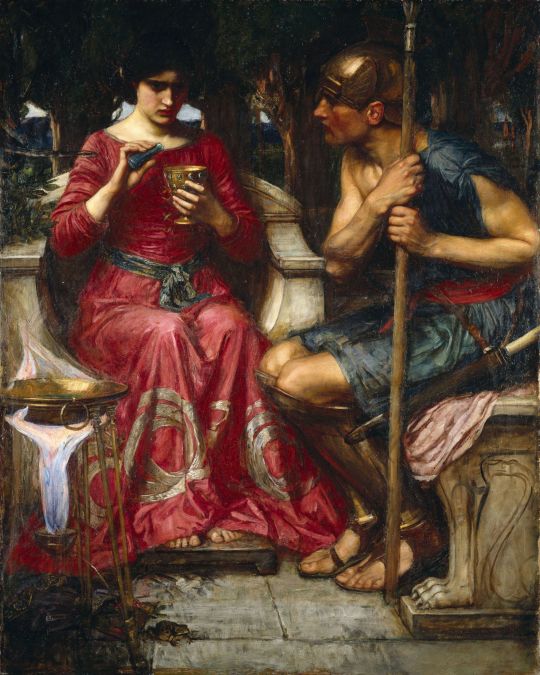
(Art: Jason and Medea by John William Waterhouse)
A similar harvesting of herbs and roots is seen in fragments of Sophocles’ play The Root-Cutters. What we have of the play states that “She [Medea] covers her eyes with her hand and collects up the white-clouded juice that drips from the cut in bronze jars...the covered chests conceal the roots, which this woman reaped, naked, with bronze sickles, while crying out and howling” (qtd. in Ogden 83). Hekate is then said to be “crowned with oak branches and snakes” (qtd. in Ogden 83). Then the women chant “Lord of the sun and holy fire [Helios], sword of Hecate of the roads, which she carries over Olympus as she attends and as she traverses the sacred crossroads of the land, crowned with oak and the woven coils of snakes, falling on her shoulders” (qtd. in Ogden 83). In this short but incredible fragment we see that Medeia calls on both Hekate and Helios, her grandfather, to bless their ritual. We also see a repeat of incantations to harvest magical herbs, and an introduction of her association with bronze.
Another one of Medea’s feats was charming the snake that guarded the Golden Fleece into a slumber. In the Argonautica, Apollonius of Rhodes writes:
“The monster in his sheath of horny scares rolled forward his interminable coils, like the eddies of black smoke that spring from smoldering logs...But as he writhed he saw the maiden take her stand, and heard her in sweet voices invoking Sleep [Hypnos], the conqueror of the gods, to charm him. She also called on the night-wandering queen of the world below [Hekate] to countenance her efforts...the giant snake, enchanted by her song, was soon relaxing the whole length of his serrated spine and smoothing out his multitudinous undulations...Yet his grim head still hovered over them and the cruel jaws threatened to snap them up. But Medea, chanting a spell, dipped a fresh sprig of juniper in her brew and sprinkled his eyes with her most potent drugs and as the all-pervading magic scent spread around his head, sleep fell on him.” (150-1).
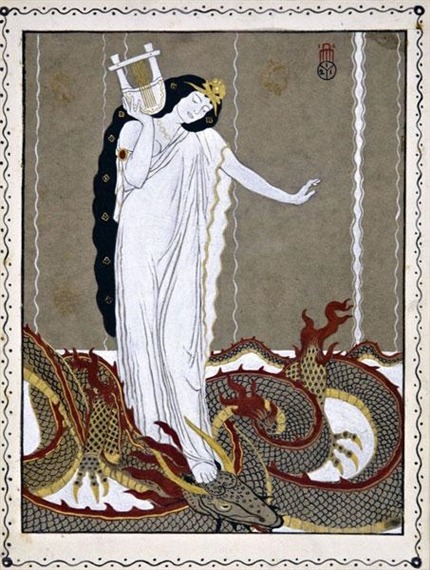
(Medea and the Dragon by Maxwell Ashby Armfield)
She was also said to have killed the giant Talos, a gift given to Zeus from Hephaistos, with her witchcraft, specifically the Evil Eye. In this more horrifying passage, it is said that:
“[W]ith incantations, she invoked the Sprits of Death [Keres], the swift hounds of Hades who feed on souls and haunt the lower air to pounce on living men. She sank to her knees and called upon them three times in song, three times with spoken prayers. She steeled herself with their malignity and bewitched the eyes of Talos with the evil in her own. She flung at him the full force of her malevolence, and in an ecstasy of rage she plied him with images of death” (Apollonius of Rhodes 192).
In this passage, she calls on the Keres, and with them is able to use the evil eye to bring immediate death to a direct creation of the gods. This is a horrifying feat, not only for the power it must require, but for her ability to kill in an instant.
Finally, she also is said to have rejuvenated Jason’s father Aeson. In Ovid’s Metamorphoses, Jason pleads with Medea to take years of his own life to give more to his father, but she rejects him saying that Hekate will not allow such a thing to take place. Instead, she offers that through her witchcraft, instead, if Hekate is willing to help her, she may rejuvenate him. Under the full moon, Medeia performs the ritual. She calls on Hekate, Night, the Moon, and Helios to aid her in her task (126-7). A chariot drawn by dragons appears to her and she takes it to gather herbs harvested with her bronze scythe. After nine days and nights, she returns to Jason to perform the ritual. The ritual is extensive and is essentially repeated in full. She builds two altars, one to Hecate and one to Hebe. She also digs two ditches on sacrifices a black sheep into the ditches, also pouring wine and milk into them. She also calls on the “deities of the earth” which may mean deities of the land or chthonic deities, and Hades. Once she appeases these gods and goddesses, she spells Aeson to sleep on a bed of herbs and tells Jason to leave her to perform her magic. She then dips sticks into pools of blood and lights them with the flames on the altars, then purifying the man once with fire, three times with water, and three times with sulfur.
She then adds many herbs, roots, and flowers to her bronze cauldron as well as “hoar frost gathered under the full moon, the wings of the uncanny screech owl with the flesh as well, and the entrails of a werewolf which has the power of changing its wild-beast features into a man’s. There also in the pot is the scaly skin of a slender Cinyphian water-snake, the liver of a long-lived stag, to which she also adds eggs and the head of a crow nine generations old” (Ovid 129). Then, she slits the throat of Aeson and replaced his blood with her potion, finally rejuvenating him.
There is more descriptions of Medeia’s magical feats throughout literature, but these are simply some of the most detailed and famous. She is clearly a very powerful witch and a significant figure within the history of Hekate worship. With her bronze cauldron and chariot of dragons, she is quite awe-inspiring.
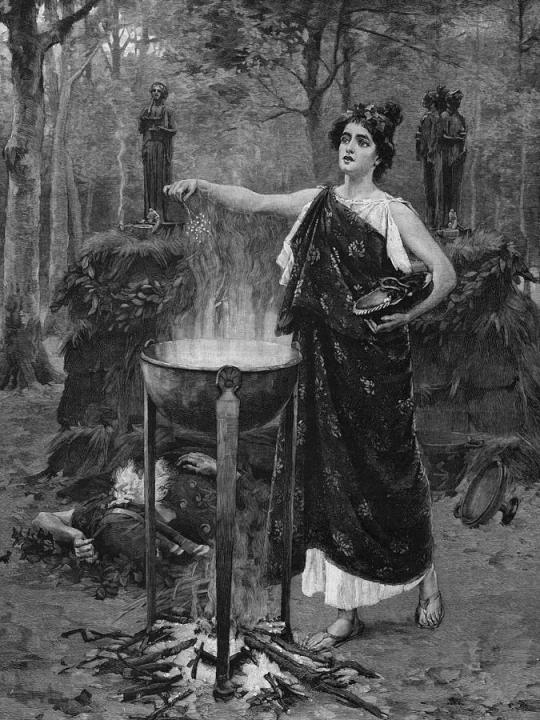
(Art: The Sorceress by R. Willis Maddox)
Medeia’s Character
One of the issues we run into with Medeia’s mythos is her defamation and portrayal as a child-murdering and vengeful woman. She is indeed vengeful against Jason, and rightfully so, for he bade her to leave her homeland, murder her brother, and constantly had her aid him with her witchcraft, only to abandon her for another. However, Euripides’ tale of her brutally murdering her children has some criticisms from scholars who note that there are other versions of the tale.
One such tale is that from Apollodorus who writes that “Another tradition is that on her flight she left behind her children, who were still infants, setting them as suppliants on the altar of Hera of the Height; but the Corinthians removed them and wounded them to death” (1.9.28). In the modern era, a scholar named Sarah Illes Johnston, author of Restless Dead and Hekate Soteira, also writes that Medea prays to Hera Akraia to make her children immortal, and Hera either declines or breaks her promise to fulfill this task, leaving the children to die (62-3). Johnston denies the implication of Medea in her children’s death, instead attributing it to circumstances outside her control or by the hand of another.
These different tellings of Medeia’s story fits with the Colchian princess who aids Jason in a much more believable way than the suddenly spiteful women who murders her children. This variation is less popular, the other being popularized perhaps to demonize magic and women of power.
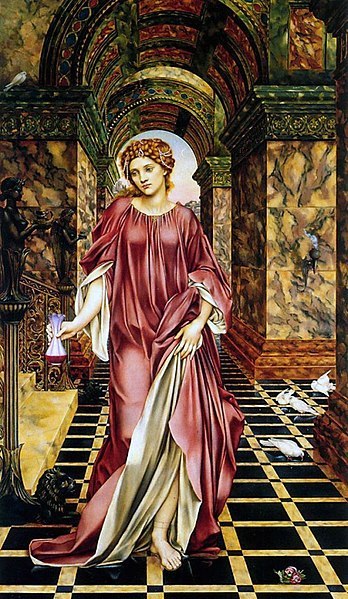
(Art: Medea by Eve De Morgan)
Worshipping Medeia
Now that Medeia’s character and mythological status has been discussed, I think it’s important to talk about how I actually go about worshipping Medeia. I worship Medeia in both divine and ancestral ways, which I suppose could be attributed to methods of hero worship in Ancient Greece. Worshipping Medeia can be done alongside Hekate and/or Helios, as well as alongside Kirke. If you observe the Mighty Dead or Witch Ancestors, she could also be worshipped alongside them.
Offerings
Offerings for Medeia can include wine, frankincense, milk, honey, food, poisons, sacred plants, bronze artifacts, candles, snake parts or figurines and dragon figurines, artifacts of witchcraft, and even Hekate iconography. One could also offer her blood, but that is up to your personal discretion.
Names and Epithets
Names/epithets I call Medeia include ‘Of the Many Spells,’ ‘Vengeful Maiden,’ ‘Witch Priestess of Hekate,’ ‘Medea of Poisons,’ ’She Who Knows All Herbs,’ ‘Giant-Slayer,’ one that could also be said of Hekate, ‘Princess of Colchis,’ ‘Granddaughter of Helios,’ ’Daughter of Sun and Moon,’ one I use to indicate her relationship to Helios and her devotion to Hekate, and Medea Pharmakeia, or Medeia of Witchcraft/Magic.
Sacred Objects
Sacred plants of Medeia could include any poisons, juniper, olive, and aconite specifically. Sacred animals include dragons and snakes. Bronze is also sacred to Medea, as are cauldrons of any kind.
Specializations
Medeia can be called upon for justice and vengeance, especially for spells of justice and vengeance, witchcraft of any kind, to bless herbs, for gardening, for aid in Hekate worship, for the downfall of your enemies, for protection from harm, for protection from snakes, and for guidance in magic.
Prayers to Medeia
Prayer for Medea’s Aid in Witchcraft
Prayer to Medea for Vengeance
Conclusion
In conclusion, while Medeia may not be a part of the usual canon of hero worship, or worship in general, if you are a devotee of Hekate or Helios, worshipping Medeia might be right for you. Likewise, any witch who observes the Hellenic pantheon should give serious thought to venerating Medeia in their practice.
Works Cited:
Medea by Euripides
Magic, Witchcraft, and Ghosts in the Ancient Greek and Roman Worlds by Daniel Ogden
The Voyage of Argo by Apollonius of Rhodes
Theogony by Hesiod
The Library by Apollodorus
The Metamorphoses by Ovid
“Corinthian Medea and the Cult of Hera Akraia” by Sarah Illes Johnston
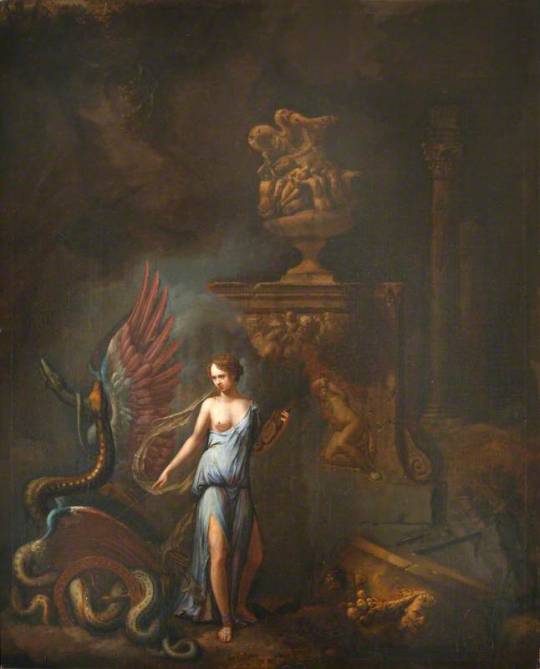
(Art: Medea Casting Spells by Henry Ferguson)
#Medea#Medea worship#hellenic polytheism#hero worship#witchcraft#witch#paganism#Hekate#hecate#hellenic witchcraft#hellenic heroes
2K notes
·
View notes
Text
Character Intro: Jason (Kingdom of Ichor)



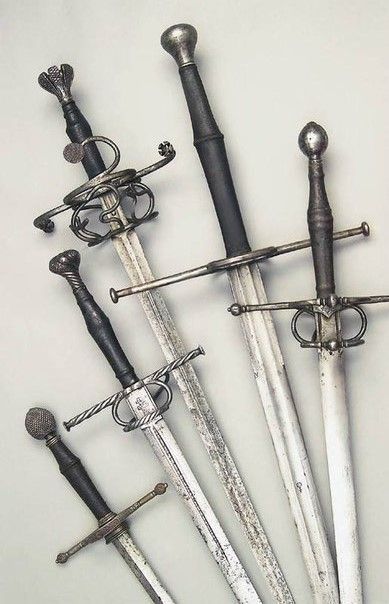


Age- 18
Location- Shimmering Tail Island, Olympius
Personality- Jason is a tenacious, stubborn, & determined young man- a natural born leader. He's also extremely charismatic and can be a bit full of himself. He likens himself to an underdog as opposed to the traditional hero trope. He's currently single & is in a whirlwind, dealing with newfound attention and fame.
Jason is the second child to his parents (who already had an adult son) Aeson & Alcimede. Aeson was the Lord of Iolcos. Their oldest son was named Promachus. Jason's entry into the world came as a welcome surprise to his parents considering they were both in their early fifties when Alcimede became pregnant again. He didn't have an easy start to life, being born into a storm of family turmoil. His paternal half uncle Pelias wanted to become the new Lord & did everything he could to take the title away from his brother. After seeing an oracle, he decided to put his deadly quest for power into motion.
One night while Alcimede was breastfeeding Jason, a group of armed men wielding guns and swords broke into their mansion. Wanting to defend his family, Aeson grabbed his sword by the bed, telling his wife to remain quiet & hidden. Alcimede realized in horror that her other son was in the basement watching movies. As soon as Aeson opened the bedroom door, the lightning quick succession of gunfire tore through him. Alcimede continued to cry and whimper when she heard the sound of Promachus' voice asking in fear, anger, & confusion, "Who sent you? Why are you doing this to us?" before the sound of clanging metal and gunfire was heard. In her heart, she knew her husband & eldest child was dead. Surprisingly throughout this horrible ordeal, Jason remained quiet, contently suckling on his mother's breast. While the other assassins pillaged through the other rooms, one of them discovered Alcimede and her baby in the tub of the bathroom. This assassin barely looked to be about seventeen- a sweaty trembling mass of skin & bones with brown eyes way too large for his face. He started to raise his sword, but couldn't when he heard Alcimede praying to the gods- asking for mercy on their souls. Taking pity on her, he told her that he didn't have a choice to participate in the murder plot. He also told her to leave at once, stating it was dangerous for her & her son to remain in Iolcos. With her husband's shirt serving as a blanket to swaddle her son & with nothing else but the clothes on her back, the young man aided Alcimede- with leaving the mansion unnoticed.
Pelias gave his award winning performance to the press. He cried on cue in front of the cameras- vowing to find the beasts responsible for tearing his family apart. To give them a punishment that even The Furies would shy away from. He also pleaded & posted a reward for the safe return of his sister-in-law and newborn nephew. It was said that the people in Iolcos came to discover the deaths of their ruler & his eldest son when a group of hunters came across their bullet ridden bodies in the forest, their decapitated heads floating in the nearby river. King Zeus & Queen Hera even visited to offer their condolences. Pelias then became the new Lord of Iolcos.
Alcimede and her son eventually found refuge in the southern part of Thessaly, taken in by a community of centaurs- one of them being the well known & wise centaur, Chiron. He immediately knew who she really was, but promised to keep her true identity confidential.
Growing up, Jason lived in a small cabin house with his mother. He loved eating mush for breakfast (a cornmeal porridge topped with maple syrup). His childhood was fairly normal- except for the instances when his mother would wake up screaming from night terrors. Jason played with the other neighborhood kids, went to school, & started taking archery lessons from Chiron. He and his mom would also partake in the neighborhood potlucks (she'd bring her bison pot roast with hominy & potatoes and fry bread topped with peppers, onion, and venison).
He came to learn the truth about his family when he came to his mother with a school assignment- a family tree project. Jason learned that he had a father & older brother and that they were killed, how he & his mom were spared, and how their uncle now ruled Iolcos.
As Jason grew into a young man, he couldn't stop thinking about the fact that he never got to know his father and brother. Or the fact that his uncle never tried to look for him & his mom- to see if they were ok. When he was sixteen, he was taking some time to himself on a beach when he noticed a distress signal being fired from a small ship. He swam a little to get a better look and saw an elderly woman flailing her arms around. He swam to her & offered his help- to swim her to shore. With the old woman on his back, Jason swam all the way to the beach. The old woman (to show her thanks) gave him a silver drachma coin. She soon transformed into a beautiful young woman with long dark reddish brown hair wearing a flowy dress, holding a golden lotus tipped staff. Queen of the heavens, the gods, & Olympius- Hera! Before disappearing in a peacock colored mist, she left Jason with these words- "Jason of Iolcos. The gods and history are keeping a close eye on you. You're the rightful heir!"
With the Queen's words swirling around in his head, he made a decision. Jason went to his mother and mentor Chiron & told them that he planned to return to Iolcos to solve the mystery behind his father's and brother's demise & to claim what was rightfully his- the Lordship. Alcimede warned him against it , saying that his uncle was a very dangerous man with little to no boundaries. Jason simply replied, "It's my destiny." Before he left, Chiron gave him one of his beloved swords, crafted from adamantine.
When he reached Iolcos (by the means of a grand ship left behind by Hera), Pelias instantly knew that the young man staring at him was his nephew. Outwardly, he never lost his cool. Jason brought forth his claims to the lord's council- with most of them agreeing that it could be a possibility that he's the lost son of Aeson. Pelias (thinking two steps ahead) offered Jason a deal. If he was truly a son of Aeson, he would set out on a seafaring quest to retrieve the golden fleece of Colchis. If he failed, Jason would be banished from Iolcos. If he succeeded, Pelias would renounce his lordship. Without a second thought, Jason accepted the challenge.
And so began the start of The Argonauts. Jason advertised the quest on Fatestagram, looking for anyone with "balls of steel" to help him along his journey. He first came into contact with an apprenticeship builder- a guy named Argus. Soon some more guys followed suit to join (Theseus, Castor, Pollux, Meleager, Hylas, Mopsus, Hercules, & many other eager and courageous young men). They came across some colorful people- like a group of sirens & mermaids that flashed them as they were making their way through Trident's Bay, or when Pollux had a boxing match with a centaur named Amycus, or when they met a weird blind "prophet" named Phineas. Theseus often live streamed their travels to Fatestagram & PanopTube. The guys would get drunk on beer, singing old sailor songs.
He & The Argonauts are also students at Chiron's training academy.
One memorable moment on the quest was when Jason & the guys made a rest stop in Lemnos. The guys were tired of being on sea for a few months (and tired of being around each other). As they were buying supplies, one of the Argos, Telamon, came up to Jason- telling him that a party was being thrown at one of the resorts. It took convincing from the rest of the guys for Jason to tag along. At the party, they all hung loose and drank way too many tequila, vodka, & rum punch. Jason started up a conversation with a beautiful girl with short and curly light blonde hair. He noticed Theseus making out with a brunette. Later that night, Jason & the girl (whose name was Hypsipyle) hooked up with each other.
The Argonauts are currently on a break from their main voyage, resting at an non descript beach house on Shimmering Tail Island (that was bought by Hera). They are all recuperating before they all get back to sailing- their next (and most important) destination being Colchis.
Jason's overwhelmed, but mostly loving the widespread attention he's been getting throughout all this. Not only does he have the support from the Queen (and one of the most powerful goddesses), he's been receiving photos & messages from girls online on his Fatestagram profile. Jason's even been approached by Pheme (goddess of fame) and Clymene (Titan goddess of fame & renown) on possible book & movie deals! He tries to keep in contact with his mother and Chiron.
"It's my destiny to be the greatest!"
#my oc#my oc character#my character#oc character#jason and the argonauts#jason and medea#oc intro#character intro#oc introduction#character introduction#modern greek mythology#greek myth retellings#greek mythology#greek myths
3 notes
·
View notes